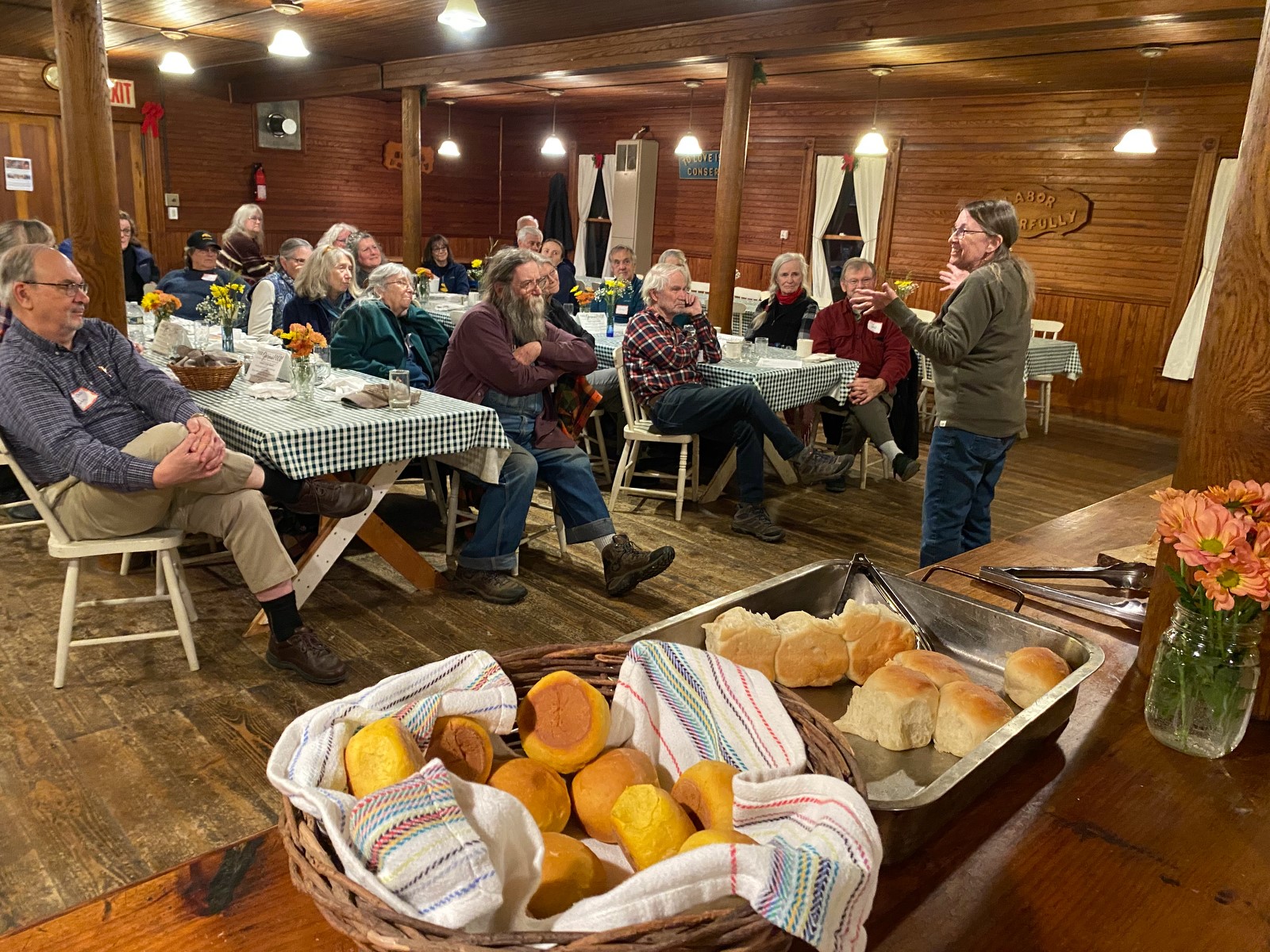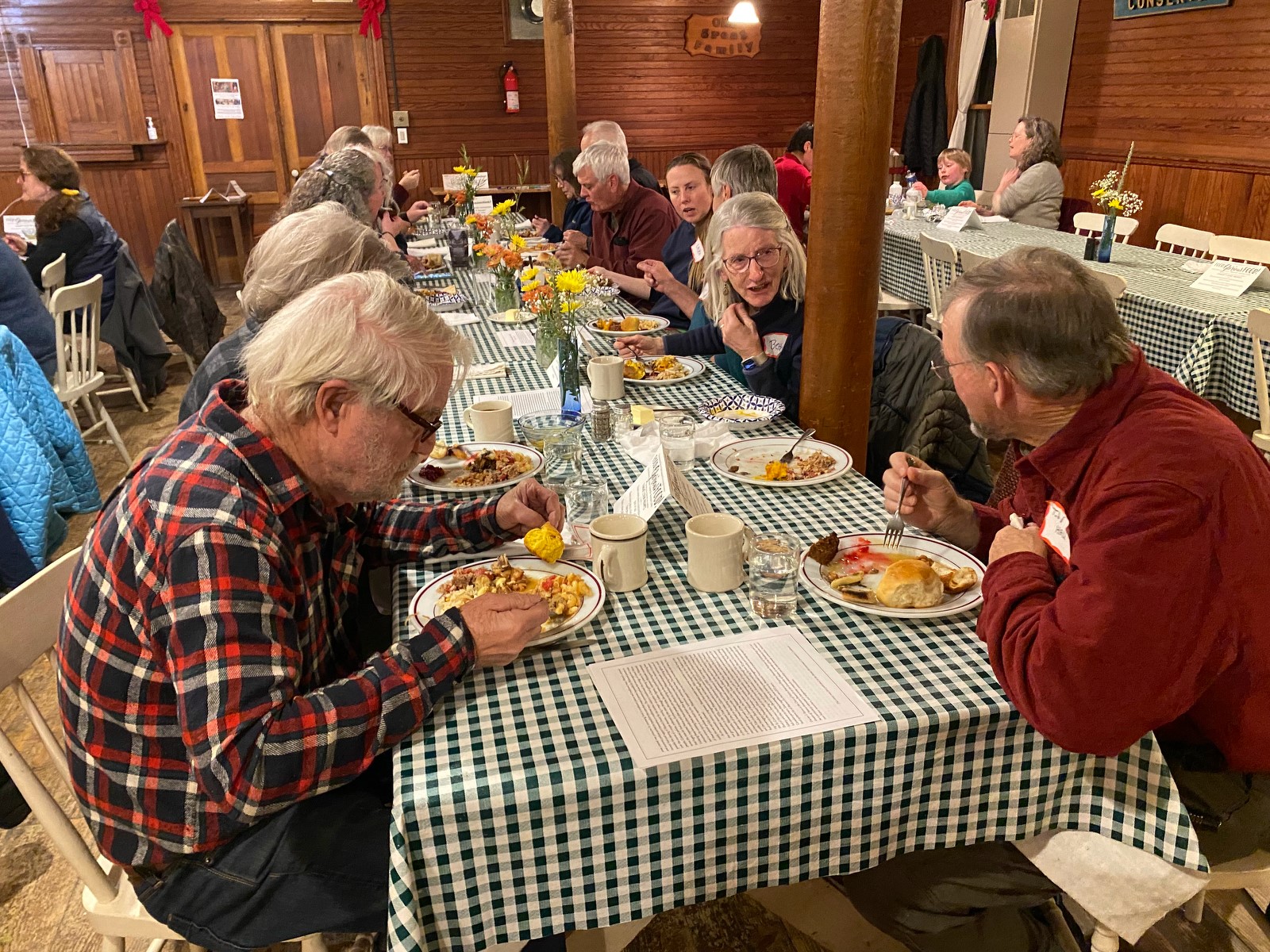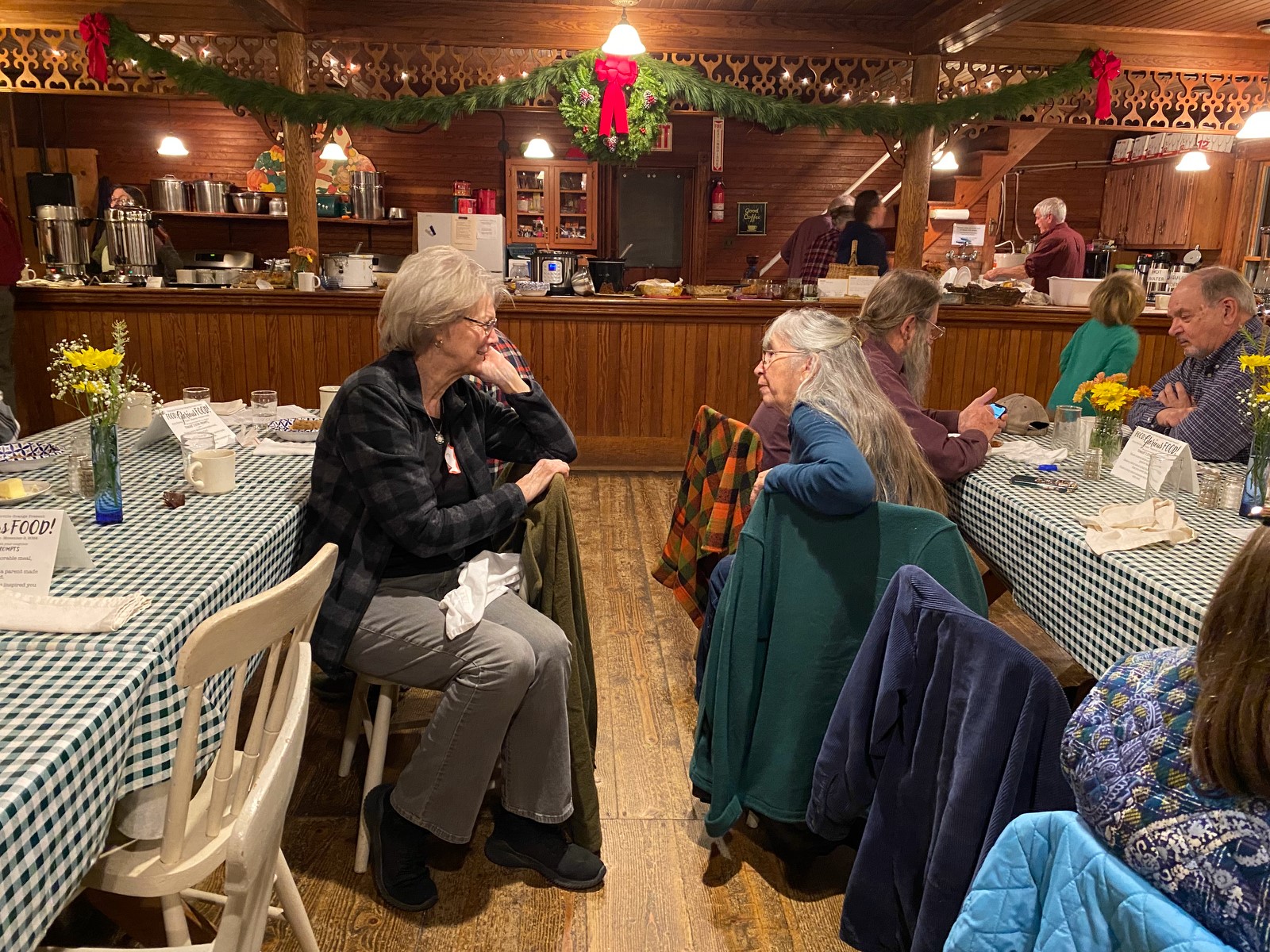By Karl Schatz
We pulled into the parking lot just after sunset, as the moon rose over the fields surrounding the 120-year-old East Sangerville Grange. Located along a rural road in Piscataquis County, Maine, the Grange is home to the local chapter of a nationwide farmer’s alliance that began in 1867 to educate farmers, advocate for agriculture, and promote social life. We were there for the latter – in the form of a potluck.

Sangerville, about an hour northwest of Bangor, is about as rural as Maine gets, and the Grange is located along a stretch of road peppered with farms. Through our non-profit organization, Community Plate, my wife Margaret and I have spent the past 18 months hosting free potluck storytelling events in places like these all over Maine — this event was our 24th supper and 12th county. Our goal: Address the loneliness that’s widespread not only in local communities, but across the nation, to foster the connection our times desperately need.
The problem is so serious that in 2023 former U.S. Surgeon General Dr. Vivek Murthy declared an epidemic of loneliness and isolation. According to the Department of Health and Human Services, over half of Americans reported experiencing loneliness even before the COVID-19 pandemic. This lack of connection, Murthy warned, can lead to physical consequences such as an increased risk of heart disease, stroke, dementia, and premature death.
His advisory cited a range of factors including crumbling trust in institutions and each other; decreasing participation in communities such as religious organizations; and technologies such as social media that replace in-person interactions. Racial and ethnic minorities, LGBTQ+ people, victims of domestic violence, and rural communities may be at particular risk, Murthy said.
We began to sense a hunger for connection in our state as we compiled materials for our 2020 book, Maine Bicentennial Community Cookbook, a volume of family recipes and stories (and precursor to Community Plate). Seeking to create a snapshot of food being cooked across Maine, the book encompasses both expected regional favorites and dishes representing the influences of immigration to the state. Our glimpses into Mainers’ kitchens revealed a diverse, interconnected community and a tremendous human desire to strengthen bonds through recipes and stories.
These stories connect us in ways that are immediately familiar, across cultural, social, economic, religious, and political divides. As the pandemic dragged on, the need to bring Mainers together became clearer. So, in March 2023, we held our first Story Sharing Potluck at our family farm in Cumberland County. The connections people made were palpable and immediate.
Dr. Jeremy Nobel, a member of Community Plate’s advisory board, is a Harvard Medical School faculty member, President of the Foundation for Art & Healing, and author of the book, Project UnLonely: Healing our Crisis of Disconnection. He has a three-step prescription for addressing loneliness: “Be curious. Make something. Have conversations.” At a community potluck, those elements are built in. Meeting new people and learning about their dishes naturally fosters inquisitiveness. Preparing your own dish to share is an act of creativity and bravery. Conversations naturally follow – and the result is connection and community.
Around the same time as the former Surgeon General published his advisory about loneliness, Harvard researchers Robert Waldinger, and Marc Schulz, released the results from the 84-year longitudinal study of adult development in their book, The Good Life. Drawn from decades of research and thousands of interviews, the main conclusion is that our essential wellbeing depends upon human connection and the maintenance of meaningful relationships.
As we began to crisscross the state working with a wide variety of local community organizations to host potluck storytelling suppers, we began to understand another need served by these events. In too many places in Maine, there are fewer and fewer public spaces where people can gather to have conversations. This matches up with national trends. Over the past two decades, as a nation, we have seen dwindling opportunities for people to establish and maintain the kinds of beneficial relationships described in the Harvard study. American participation in organized religion, social and service clubs are at historic lows. Civic deserts–communities without opportunities for civic engagement–are on the rise. According to findings from a 2024 survey by the Survey Center on American Life, more than half of Americans live in communities with no or minimal access to places where they can meet and talk to neighbors, and more than half of Americans report “seldom” or “never” talking to someone in their community that they don’t know well.
The causes are intertwined: We are spending more time on screens than in face-to-face conversations, increased political and cultural polarization makes us hesitant to engage with people we don’t know, and the COVID-19 pandemic put us all out of practice when it comes to gathering in public. In each case, we need help exercising a social muscle that has begun to atrophy.
Community potlucks create these critically needed spaces for Americans to gather and have conversations with people in their community that they may not know or know well. They create valuable opportunities for powerful, unexpected connections, and the serendipity of conversations with new people stimulates our imagination and makes us feel more connected to our immediate community and the broader world around us. At Community Plate events we encourage people to make a new connection by sitting with someone they don’t know. I’m always a little surprised by how many people take us up on the opportunity.
 At each of our suppers, story prompts–we use food topics as a universal connector–on cardstock table tents provide scaffolding for the conversations and informal story sharing that takes place over the meal. Creating a framework for conversation can help take the pressure off, and even attendees who consider themselves introverted find themselves engaging with others across the table. For those who may feel shy to share, emphasize the importance of active listening, and give permission to stay quietly attentive. After all, storytelling is a two-way street, and you can’t have storytelling without story listeners, giving the gift of their attention. As the philosopher Simone Weil wrote, “Attention is the rarest and purest form of generosity.” We encourage this generosity of attention to both the people around the table and the stories and food that they bring to it.
At each of our suppers, story prompts–we use food topics as a universal connector–on cardstock table tents provide scaffolding for the conversations and informal story sharing that takes place over the meal. Creating a framework for conversation can help take the pressure off, and even attendees who consider themselves introverted find themselves engaging with others across the table. For those who may feel shy to share, emphasize the importance of active listening, and give permission to stay quietly attentive. After all, storytelling is a two-way street, and you can’t have storytelling without story listeners, giving the gift of their attention. As the philosopher Simone Weil wrote, “Attention is the rarest and purest form of generosity.” We encourage this generosity of attention to both the people around the table and the stories and food that they bring to it.
We’ve now hosted 30 Story Sharing Suppers which have happened in small church basements, community centers, under tents, in libraries, theatres, art galleries, and in between the posts of a retrofitted cow barn. The impact has been the same each time. In post-potluck surveys, 98 percent of respondents report making a connection with someone they didn’t know or didn’t know well. Eighty-six percent report feeling more connected to their community, 88 percent report feeling listened to or heard, and 85 percent report feeling generally more optimistic.
Such outcomes, we believe, are part of why Murthy included potlucks in “Recipes for Connection,” a booklet he released last fall as a resource to help build meaningful relationships.
More powerful than these statistics are the anecdotes of connection that we hear from participants: Friends made, coffee dates set, invitations to fish on a local lake, or to learn how to make a pie crust in a stranger’s kitchen.
“I learned different ways that I was connected to the people that I sat next to even though they lived in a different town and had very different lives,” reported one supper attendee.
“By the time I left, they were no longer strangers. It was a reminder of how we are all connected in unexpected ways.”
“I enjoyed meeting new and old friends at the dinner,” wrote another participant.
“Someone who I’ve seen at other local events told me she was happy to see me there. I didn’t know that I would make someone feel that way and her comment made me feel special. I look forward to seeing her around town as well.”
For all the connections that are reported to us from each supper, we know there are hundreds of others, unknown to us, rippling out through the communities after we leave town: a farmers’ market vendor recognizing a customer in a new context, people bumping into each other at a store or coffee shop, parents discovering their kids are in school or extracurricular activities together. Civic reconnection is possible. All we need to do is put down our phones, pick up a fork and spoon, and be open to the connection.
These gatherings are something anyone can do. They don’t have to be fancy, but we have found that small touches like assorted vintage china, cloth napkins, metal flatware, and fresh flowers can elevate the meal and bring out the best in people. Don’t worry about assigning food—we’ve organized potlucks for as few as 14 people to as many as 100—the meal always has a way of working out.
The most important thing, no matter how the meal comes together, is that we make a concerted effort to sit down together. The 2025 World Happiness Report, assembled by the University of Oxford in partnership with Gallup, for the first time shows a direct correlation between sharing meals with others and greater subjective wellbeing. This holds true across regions, countries, cultures, genders, and all age groups, and is especially relevant in the United States, where loneliness and social disconnection are at an all-time high. According to the report, “roughly 1 in 4 American adults (26 percent) now report eating all of their daily meals alone — an overall increase of more than 50 percent since 2003.” It’s a trend well within our ability to reverse, with a simple invitation to dinner.
 That evening at the East Sangerville Grange, the feeling of warmth grew as potluck attendees trickled in. People placed their dishes on the bar, sharing with each other what they brought: winter squash and greens, baked beans and brown bread, sourdough dinner rolls, a box of chocolate chip cookies from the local store. This is how it always goes: The buzz of conversation begins as soon as the dishes are set down.
That evening at the East Sangerville Grange, the feeling of warmth grew as potluck attendees trickled in. People placed their dishes on the bar, sharing with each other what they brought: winter squash and greens, baked beans and brown bread, sourdough dinner rolls, a box of chocolate chip cookies from the local store. This is how it always goes: The buzz of conversation begins as soon as the dishes are set down.
As we think about ways to engage in civic life and build resilient community, we encourage everyone to consider organizing – or at least attending – a potluck. And then make a dish. Share a story. Build community. As one attendee at the Grange told us, “Sometimes we just need a reason to get together.”
Karl Schatz is the co-founder and executive director of Community Plate, a Maine nonprofit dedicated to building community through shared food and stories. A version of this article appeared in the December 22, 2024, issue of The Boston Globe Magazine.



